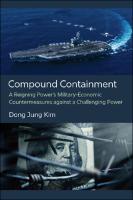Compound Containment
External Review of Whole Manuscript
A Reigning Power's Military-Economic Countermeasures against a Challenging Power
| dc.contributor.author | Kim, Dong Jung | |
| dc.date.accessioned | 2022-04-04T14:09:36Z | |
| dc.date.available | 2022-04-04T14:09:36Z | |
| dc.date.issued | 2022 | |
| dc.identifier | OCN: 1287024659 | |
| dc.identifier.uri | https://library.oapen.org/handle/20.500.12657/53689 | |
| dc.description.abstract | When does a reigning great power of the international system supplement military containment of a challenging power by restricting its economic exchanges with that state? Scholars of great power politics have traditionally focused on examining a reigning power’s military containment of a challenging power. In direct contrast, Compound Containment demonstrates that these conventional studies are flawed without a sound understanding of the multilayered aspects of containment strategy in great power politics. Since economic capacity and military power are intimately linked to one another, countering a challenging power requires addressing both economic and military dimensions. Nonetheless, this nexus of security and economy in a reigning power’s response to a challenging power cannot be explained by traditional theories that dominate research in international security. Author Dong Jung Kim fills a gap in the scholarship on great power competition by investigating when a reigning power will make its military containment of a challenging power “compound” by simultaneously employing restrictive economic measures. Its main theoretical claims are corroborated by an analysis of key historical cases of reigning power-challenging power competition. This book also offers policy prescriptions for the United States by examining whether the United States is in a position to complement military containment of China with restrictive economic measures. | en_US |
| dc.language | English | en_US |
| dc.subject.classification | thema EDItEUR::J Society and Social Sciences::JP Politics and government::JPS International relations::JPSD Diplomacy | en_US |
| dc.subject.classification | thema EDItEUR::J Society and Social Sciences::JW Warfare and defence | en_US |
| dc.subject.other | Balance of Power, Balancing, Cold War, Containment: Economy-Security Nexus, Economic Statecraft, Economic Warfare, Geoeconomics, Grand Strategy, Great Power Politics, Hegemonic Competition, Interdependence, International Relations Theory, International Structure, Liberalism, Major Wars, Material Power, Realism, Rise of China, Sino-U.S. Competition, Structural Theory, Thucydides Trap, U.S. Foreign Policy | en_US |
| dc.title | Compound Containment | en_US |
| dc.title.alternative | A Reigning Power's Military-Economic Countermeasures against a Challenging Power | en_US |
| dc.type | book | |
| oapen.identifier.doi | 10.3998/mpub.11622137 | en_US |
| oapen.relation.isPublishedBy | e07ce9b5-7a46-4096-8f0c-bc1920e3d889 | en_US |
| oapen.relation.isFundedBy | b818ba9d-2dd9-4fd7-a364-7f305aef7ee9 | en_US |
| oapen.relation.isbn | 9780472132980 | en_US |
| oapen.relation.isbn | 9780472039005 | en_US |
| oapen.relation.isbn | 9780472129942 | en_US |
| oapen.collection | Knowledge Unlatched (KU) | en_US |
| oapen.imprint | University of Michigan Press | en_US |
| oapen.pages | 212 | en_US |
| oapen.place.publication | Ann Arbor | en_US |
| peerreview.anonymity | Double-anonymised | |
| peerreview.id | d98bf225-990a-4ac4-acf4-fd7bf0dfb00c | |
| peerreview.open.review | No | |
| peerreview.publish.responsibility | Scientific or Editorial Board | |
| peerreview.review.decision | Yes | |
| peerreview.review.stage | Pre-publication | |
| peerreview.review.type | Full text | |
| peerreview.reviewer.type | External peer reviewer | |
| peerreview.title | External Review of Whole Manuscript | |
| oapen.review.comments | The proposal was selected by the acquisitions editor who invited a full manuscript. The full manuscript was reviewed by two external readers using a double-blind process. Based on the acquisitions editor recommendation, the external reviews, and their own analysis, the Executive Committee (Editorial Board) of U-M Press approved the project for publication. |

